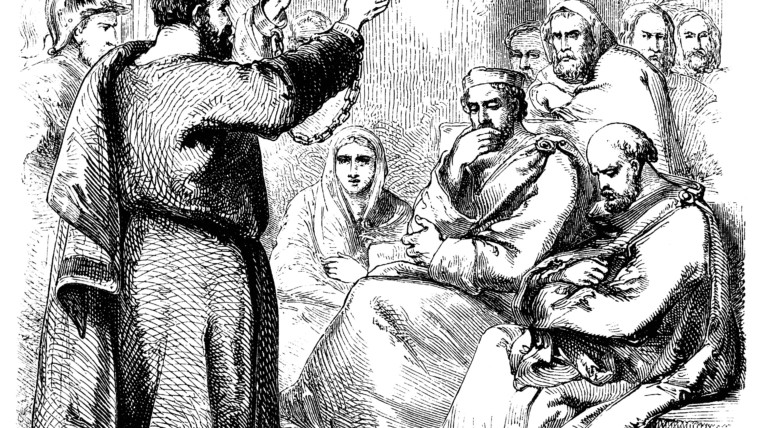The Church in the Wilderness
by Christine Egbert
When I first came to the Lord back in 1987, I started reading the Bible. In the New Testament, I learned that Jesus—the One I now call by His Hebrew name, Yeshua—was God’s Passover Lamb. Beyond that, all I knew about Passover was that it was celebrated by the Jewish people to commemorate God saving them from slavery in Egypt. By 2007, twenty years later, I had read through the New Testament multiple times. And although I had not read through the entire Old Testament even once, I was quite familiar with Genesis, Psalms, Proverbs, Isaiah, and select sections of other Old Testament books.
The more I studied the Bible, the hungrier I grew for a more authentic Christian experience. So, in 2007, after reading two eye-opening books, Your People Shall Be My People by Don Finto and The Messianic Church Arising! Restoring the Church to Our Covenant Roots by Dr. Robert Heidler, I left what I now call Constantine-Christianity and started attending a small Messianic Congregation. There, I began to learn the significance of God’s Feast Days and Sabbaths (Leviticus 23:2, Ezekiel 44:24).
When you take all of the LORD’s (Yahweh’s) Appointed Times, for that is what mo’ed (the Hebrew word translated as Feasts) means, they paint a picture more detailed than the one pinned by John Bunyan in his allegory Pilgrim’s Progress of God’s plan for Salvation, Sanctification, and Restoration. His appointed times (Feast Days, New Moons, and Sabbaths) cast a heavenly shadow of things (events) to come (Colossians 2:16-17).
Paul warns us in Colossians to watch out that no man robs us through philosophy and empty deceit, according to the traditions of men, rather than according to our Messiah, for these Appointed Times are the shadow of the Body of Messiah.
Passover
Passover depicts God’s provision for Israel’s salvation through the shed blood of the sacrificed Lamb. Israel’s part was to believe God. Faith is demonstrated by obedience to God’s instructions. So, they applied the blood of the lamb to their doorposts and left Egypt.
The Wilderness
In the wilderness, while Moses was up on the Mountain meeting with the LORD (Yahweh), Israel began to doubt. Because Moses wasn’t there to lead them, they petitioned his brother, Aaron, to make them gods (Elohim in Hebrew) to go before them. This, I sadly believe, is a picture of where many in the Church are today. After applying the blood of the Lamb to the door of their hearts and leaving Egypt, they are wandering around in the wilderness, worshiping the LORD (Yahweh) in a mixed form of religion, just like the children of Israel did in Exodus 32:4-5 when Aaron formed the golden calf and declared: “This is your god (Elohim), Israel, who brought you up from the land of Egypt.”
Israel thought they were worshiping the LORD (Yahweh). That was their intention, their good intention. It was what was in their heart. But they were worshiping the LORD (Yahweh) like they had worshiped false gods back in Egypt. And guess what? The LORD (Yahweh) did not say, “That’s okay. I know their heart. They mean well.” No. God got angry. He told Moses they were corrupted. And in Exodus 32:10, He ordered Moses to leave Him alone so that His anger could glow against them so that He could consume them. But then Moses intervened on Israel’s behalf, and God showed them mercy.
What Christians Should Learn
Sadly, many Christians have been taught that after they apply the blood of the Lamb to the doorpost of their heart, they are free to worship the Most High whenever and however they choose because God knows their heart. Only Scripture warns us that the heart is deceitfully wicked. (Jeremiah 17:9)
Hebrews 3:10 says, “They always go astray in their heart, and they do not know My ways.” In Deuteronomy 12:30, and various other places throughout the Bible, God warns His people not to be snared into worshiping Him the way the nations worship their gods. But after two centuries of being taught that God’s Law (Torah) was done away with, most Christians have never gone to the mountain and taken their wedding vows. They have never said, “All that the LORD (Yahweh) has spoken we will do.”
Marriage Covenant
God’s Law, His Torah, is our marriage covenant—or Ketuba in Hebrew. In a covenant, two parties (God and His People) make conditional promises to each other.
Exodus 19:4-8 “You have seen what I did to Egypt; and I bore you on wings of eagles and brought you to Me. And now if listening you will listen to My voice and will keep My covenant, you shall become a special treasure to Me above all the nations. For all the earth is Mine. And you shall become a kingdom of priests for Me, a holy nation. These are the words which you shall speak to the sons of Israel. And Moses came and called the elders of the people. And he put all these words before them which the LORD (Yahweh) commanded him. And all the people answered together and said, ‘All which the LORD (Yahweh) has spoken we will do.’ And Moses brought back the words of the people to the LORD (Yahweh).”
When Israel answered, “All which the LORD (Yahweh) has spoken we will do,” they were married. Without the “I do” there is no marriage covenant. God writes His Laws (Torah instructions) in our mind and on our heart—Hebrews 8:8. He gives us His Holy Spirit so that we can fulfill the Torah’s righteous requirements (Romans 8:4)—fulfill our marriage contract.
Isaiah 46:9-10 says: “Remember the former things of old, for I am God, and there is none else. I am God and there is none like me, declaring the end out of the beginning, and from ancient times things that are not yet done…”
Through studying Torah (Genesis through Deuteronomy) we begin to see The Most High’s pattern. If you want to know the future, study the past. That which befell the Patriarchs is not mere history. It’s prophecy. God’s Sabbaths, New Moons, and Appointed Times are shadows of what is to come. The events depicted in the Spring Feasts have already happened. Those events depicted by the Fall Feasts will unfold at the end of days (Colossians 2:16-17).
Thankfully, more and more Christians today, during what I believe is the beginning of the restoration of all things, spoken of in Acts 3:19-21, are hearing God’s voice. They are not hardening their hearts as Israel did in the provocation. They are no longer attempting to worship God through manmade doctrines enacted by Constantine. They are returning to the old paths, where the good way is (Jeremiah 6:16), and worshiping Israel’s Messiah by walking in His Ways and following His Instructions, His Torah.
Hebrews 3:9-19
“Your fathers tempted Me, testing Me, and saw My works forty years. Because of this, I was angry with that generation and said, ‘They always go astray in their heart, and they did not know My ways, so I swore in My wrath, they shall not enter into My rest.’ Watch, brothers, lest perhaps there shall be in any of you an evil heart of unbelief, withdrawing from the living God. But exhort yourselves each day, as long as it is called today, that not any of you be hardened by the deceit of sin [transgression of the Law]. For we have become partakers of Messiah, if truly we hold the beginning of the assurance firm to the end as in the saying, ‘Today, if you hear His voice, do not harden your hearts as in the provocation.’ For hearing some, not all, coming out of Egypt through Moses provoked Him. But with whom was He angry forty years? Was it not with the ones sinning [violating His instructions], whose corpses fell in the wilderness? And to whom did He swear they would not enter into His rest, except to those not obeying? And we see that they were not able to enter in because of unbelief.” (LITV)
The writer of Hebrews makes an important correlation between belief and obedience. True belief always leads to obedience, which is why James wrote, “Faith without works is dead.” Today, due mostly to hard hearts and false doctrine, many Christians who applied the blood of the Lamb of God to the doorpost of their hearts are still wandering around in the wilderness. There, they worship Israel’s God but not according to His instructions, His Torah. They worship Him according to Church traditions and manmade doctrines as they await a pre-tribulation rapture, which I will leave for another article.
After forty years of this wandering, Joshua and Caleb led a new generation of Israelites (not those who hardened their hearts and perished in the wilderness) into the Promised Land.
“Surely the land whereon your feet have trodden shall be your inheritance, and your children’s forever, because you wholly followed the LORD (Yahweh) my God. (Joshua 14:9)
Ephesians 2:8 assures us that we are saved by grace through faith, and not by our own works. But remember that Ephesians 2:10 tells us the “purpose” for our salvation. We are saved so that we will walk (do, live by) those good works the Most High has ordained us to walk in. So today, if you hear His voice, do not harden your hearts. Do not become like that first generation who after applying the blood of the lamb to their doorposts exited Egypt, only to perish wandering in the wilderness. I encourage you, “Hold firm the beginning of your assurance to the end…” (Hebrews 3:14). Enter into God’s rest…and always remember that obedience is better than sacrifice.



